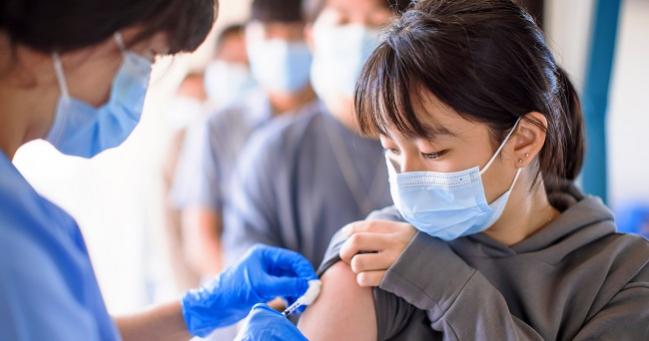Myocarditis After COVID-19 Vaccination Less Serious Than Prepandemic Cases
Myocarditis cases linked to the mRNA vaccines are typically more benign than those caused by infections, Hong Kong data affirm.

Individuals who develop myocarditis after receiving the mRNA-based COVID-19 vaccine from Pfizer/BioNTech fare much better than those who develop the condition for other reasons, affirm data from Hong Kong.
After statistical adjustment, vaccine-associated myocarditis was associated with a 92% lower relative risk of death within 6 months compared with what was seen with myocarditis cases in the prepandemic era (adjusted HR 0.08; 95% CI 0.01-0.57), according to researchers led by Francisco Tsz Tsun Lai, PhD, and Edward Wai Wa Chan, MPH (both from the University of Hong Kong). Rates of other adverse outcomes, including heart failure and dilated cardiomyopathy, tended to be lower as well.
The findings, published online ahead of the December 13, 2022, issue of the Journal of the American College of Cardiology, are consistent with prior, mostly descriptive studies indicating that myocarditis cases related mRNA vaccination have a relatively benign clinical course and expand on the body of literature by providing a comparison between vaccine-associated and other infection-related cases out to 180 days.
“Based on the results, people should be less worried about this rare side effect of mRNA vaccine because we show that, even if you get this very rare condition, it is drastically different from the typically seen myocarditis otherwise acquired—much less severe,” Lai told TCTMD via email.
SARS-CoV-2, like other viruses, can itself cause myocarditis, and the mRNA vaccines—including the shots from Pfizer/BioNTech and Moderna—have been shown to be effective even against the newer variants, he noted. “Myocarditis, the only main side effect, is now shown to be much less severe than typical viral-infection-related myocarditis,” said Lai. “The benefits from vaccination, therefore, far outweigh the risks from it.”
Better Outcomes, Similar Healthcare Use
For the study, the investigators turned to the public healthcare and vaccination databases in Hong Kong to identify patients 12 and older who were hospitalized within 28 days of receiving a dose of Pfizer/BioNTech vaccine (excluding those positive for COVID-19) and a historical cohort of patients with infection-related myocarditis between 2000 and 2019.
The analysis included 104 patients who developed vaccine-associated myocarditis between March 6, 2021—when the Pfizer/BioNTech shot was first introduced in Hong Kong—and March 31, 2022, with most (92.3%) having received one or two doses; the rest received three doses. During that period, there were roughly 8.9 million doses of vaccine administered to about 4 million people. The incidence of vaccine-associated myocarditis was 2.61 per 100,000 vaccinated people.
That group was compared with 762 patients who developed myocarditis in the prepandemic period.
Through 6 months of follow-up, there was only one death in the vaccine group, resulting in a much lower rate than what was seen in the prepandemic period (1.0% vs 11.0%). There were also lower rates of dilated cardiomyopathy (1.0% vs 3.7%) and heart failure (1.9% vs 12.2%), with no heart transplants recorded in either group. After statistical adjustment, the risk of mortality was significantly lower for vaccine-associated cases. There were no significant differences for the other outcomes, “possibly due to the modest sample size,” Lai said.
Healthcare use tended to be similar in both groups. At least one visit to the accident and emergency department was recorded in 20.4% of vaccine-associated myocarditis cases and 28.4% of other cases, and roughly one-third of patients in each group were hospitalized during follow-up. ICU admission was infrequent (about 1%) in each group.
The researchers say the findings are generally consistent with previous studies exploring myocarditis associated with mRNA vaccination, with cases identified in this study being more likely in males and younger individuals, and carrying a better prognosis, than those identified before the pandemic.
Reassuring Results
Peter Liu, MD, who wrote an accompanying editorial with Tahir Kafil, MD (both from the University of Ottawa Heart Institute, Canada), told TCTMD that the findings regarding the lower rates of death and other outcomes among vaccine-associated cases are reassuring. “This is all good news and confirms, I think, a lot of the other conclusions from large cohort studies,” he said.
Both the investigators and the editorialists detail multiple limitations of the study, including the retrospective design, the lack of a standardized case definition for myocarditis, the inability to confirm diagnoses using other tests like cardiac magnetic resonance imaging, and the use of a prepandemic comparator group.
Even so, the analysis reinforces the concept that the benefits of vaccinating against COVID-19 outweigh these “extremely rare” complications of the vaccine in the context of ongoing transmission of the virus in the community, Liu said. “Vaccines are still super important as . . . tools to keep our population healthy.”
In their editorial, Liu and Kafil highlight the need to remain vigilant about the risk of myocarditis moving forward. “Given the anticipated need for regular COVID-19 booster vaccinations and advancements in mRNA technologies for various other medical indications, vaccine myocarditis will continue to be an ongoing challenge into the foreseeable future,” they write, expressing excitement about “the global enthusiasm and renaissance in myocarditis research.”
“We will need to work collaboratively to capture the longer-term outcomes in these patients, to identify the specific individual risk factors leading to the development of myocarditis, and mitigation strategies for those who are affected,” they continue. “Joining global collaborations will be critical for our collective success. Whereas this present study provides a reassuring initial look at 6-month outcomes data after [Pfizer/BioNTech] vaccination, it is not yet time to roll down our sleeves.”
Todd Neale is the Associate News Editor for TCTMD and a Senior Medical Journalist. He got his start in journalism at …
Read Full BioSources
Lai FTT, Chan EWW, Huang L, et al. Prognosis of myocarditis developing after mRNA COVID-19 vaccination compared with viral myocarditis. J Am Coll Cardiol. 2022;80(24):2255-2265.
Liu PP, Kafil TS. COVID-19 vaccine myocarditis: cautious reassurance in an era of dynamic uncertainty. J Am Coll Cardiol. 2022;80(24):2266-2268.
Disclosures
- This study was funded by a research grant from the Food and Health Bureau of the Government of the Hong Kong Special Administrative Region.
- Lai reports being partially supported by the Laboratory of Data Discovery for Health (D24H) funded by AIR@InnoHK administered by the Innovation and Technology Commission; having been supported by the RGC Postdoctoral Fellowship under the Hong Kong Research Grants Council; and having received research grants from the Food and Health Bureau of the Government of the Hong Kong Special Administrative Region, outside the submitted work.
- Lai reports being partially supported by the Laboratory of Data Discovery for Health (D24H) funded by AIR@InnoHK administered by the Innovation and Technology Commission; having been supported by the RGC Postdoctoral Fellowship under the Hong Kong Research Grants Council; and having received research grants from the Food and Health Bureau of the Government of the Hong Kong Special Administrative Region, outside the submitted work.
- Chan, Kafil, and Liu report no relevant conflicts of interest.




Comments